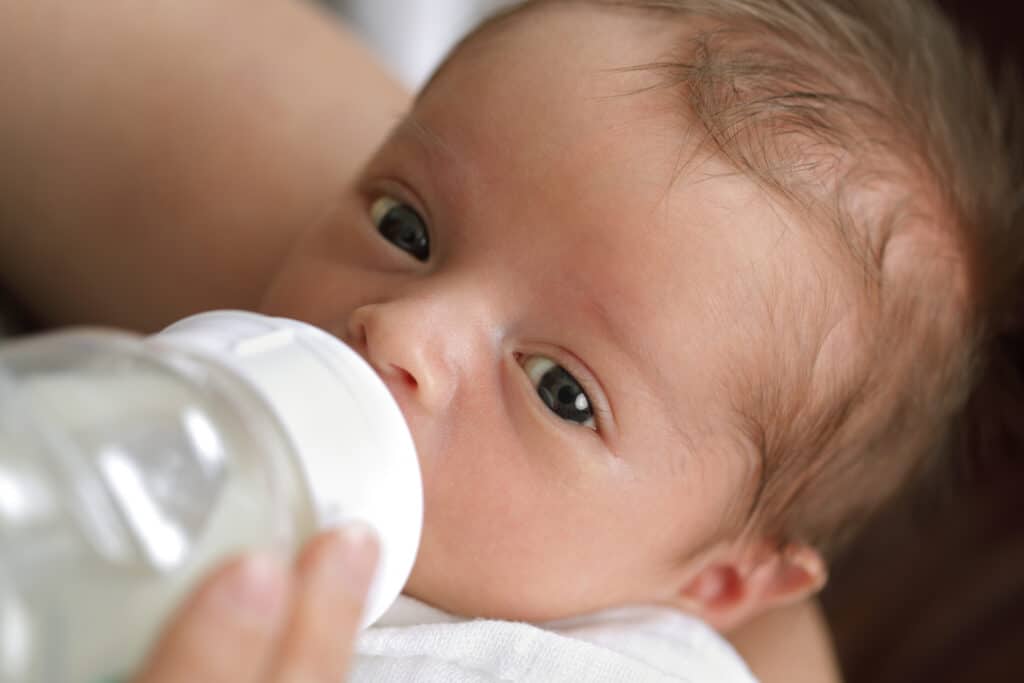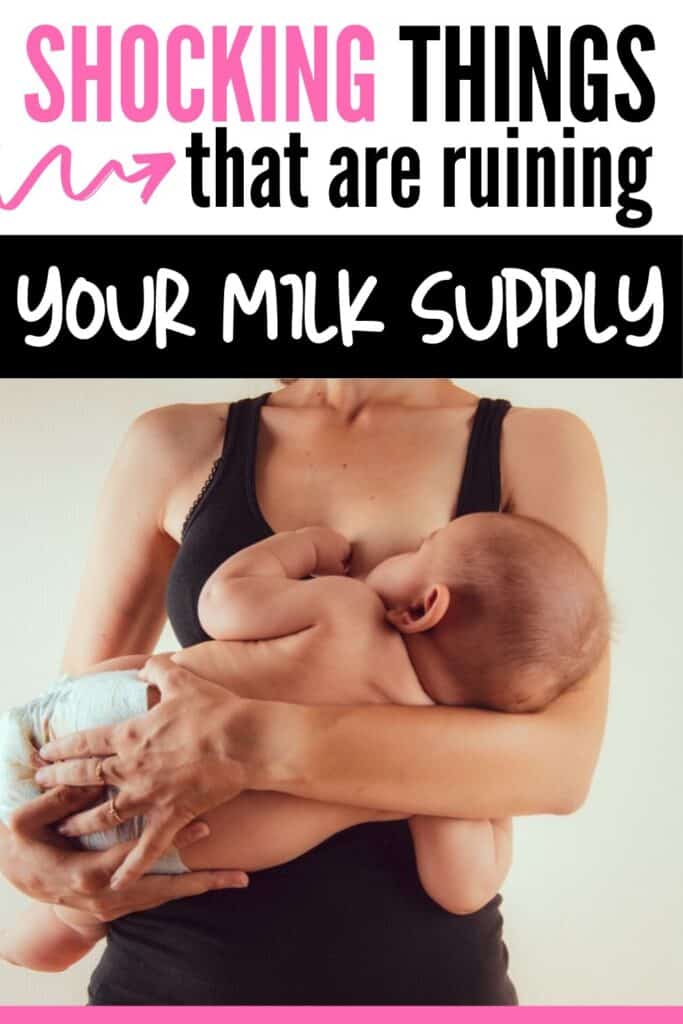If you’re breastfeeding or pumping it’s likely that you’ve got your milk supply heavy on your mind.
While most of the time, if you’re feeding your baby when they’re hungry, you’ve got nothing to worry about, there may be some mistakes you’re unknowingly making that will cause a sudden drop in milk supply.
Here are 10 of the worst things you can do to compromise your milk production.

This post contains affiliate links. Read my policy here.
Why you might be experiencing a sudden drop in milk supply
You’re not feeding on demand
When baby nurses, he’s signalling to your body to make more milk. That’s why breastfeeding has always been described as a supply and demand thing.
In those first few weeks, and potentially months, your baby likely won’t be feeding based on what the clock says, but rather when they’re hungry.
Many times, especially when baby is going through a growth spurt, your baby will cluster feed– which is when a baby will feed a lot in a very short amount of time.
Don’t pass off your baby’s desire to feed a lot within a short amount of time as your baby just being unusually fussy. Babies cluster feed when they’re going through a growth spurt and they do this to get your supply up.
Ignoring common cluster feeding signs is likely to decrease your milk supply.
You might remember your baby wanting to cluster feed on day 2, and there’s also well documented research to suggest baby will enter many growth spurts during their first few months of life, and cluster feeding is common during those times.
Related: Does power pumping work to increase your milk supply?
Your baby is using a pacifier

Trust me, I know the wonders of a pacifier, especially with a screaming newborn that can’t be consoled. However, If exclusively breastfeeding your baby is a goal of yours, I’d try to avoid the pacifier at all costs for those first several weeks.
According to a recent study about the effects of pacifiers on breastfeeding success, there is some concern about a pacifier causing nipple confusion and an incorrect latch.
The study does point out that while there is concern, the data isn’t strong enough to tell mothers to swear off pacifiers all together.
Here’s the bottom line: If you feel like your milk supply is low (especially in those first few weeks) try to avoid the pacifier at least until your supply is established, which typically happens by 6 weeks postpartum.
If your baby just won’t be without a pacifier make sure that you’re offering a feeding session enough times per 24 hours. Newborns will nurse 8-12 times per 24 hours in the first month and will then cut back to about 7-9 times by 4-6 weeks.
- Interested in an online breastfeeding course taught by a lactation consultant? I loved this course and I know you will too!
You’re entertaining too many people
In the days and weeks following your return home from the hospital, it’s likely that everyone you ever knew wants to come visit. And that’s great, just as long as they bring food or do some laundry (kidding…well, only sort of!).
Visitors are fine as long as they pop in and out. Guests that want to linger may make you stretch feedings out for longer because you might feel awkward breastfeeding in mixed company.
If you have no qualms about breastfeeding with visitors, by all means, let people come over, but do be aware of your recovery and make sure there’s plenty of time for you to rest, too!
Your baby falls asleep while breastfeeding too often
Many times, a newborn will finish breastfeeding and be completely worn out– which is totally normal. However, if your baby routinely falls asleep after only breastfeeding for a small amount of time or before they have a chance to feed on the other side, it could be tanking your milk supply.
Remember how I said breastfeeding was a supply and demand thing? Well, if baby is only eating small amounts because they’re falling asleep soon after latching, this is signalling to your body to make less milk.
Keep baby awake by singing, tapping on the bottom of their feet, or changing your baby’s diaper after they’ve nursed on one side. Whatever it takes, don’t let them fall asleep until they’ve nursed on both sides and are full.
You’re supplementing with formula at night
Sooner or later mom needs a break from night feedings so she doesn’t walk around like a zombie during the day. But if you’re letting your partner feed your baby at night and you’re sleeping through or even pumping, chances are your milk supply will decrease.
Yes, pumping also signals to your body to make more milk, but even the best pumps on the market are not as effective as your baby is at emptying your breasts.
You’re not drinking enough water
Breastfeeding a newborn will dehydrate you quickly if you’re not replacing lost fluids with water.
Did you know that breastmilk is about 90% water?! Breastfeeding moms should aim to get 96 ounces of water per day, which may seem like a ton, but when you’re breastfeeding a newborn all day you need a lot of liquids.
I witnessed firsthand just how important water was to milk supply and many times when I went back to work and didn’t pump that much during one session, I’d drink a ton of water and try again in an hour or so and voila, my milk supply was back to normal.
Anytime you’re pumping or feeding, make sure to have water next to you, and aim to finish 8 ounces or so each feed or pumping session.
Related: How to use a haakaa breast pump
You’re drinking too much caffeine
Nine months was a long time to go with little to no caffeine and so it’s no wonder many moms are ready to add caffeine back to their diet– especially with the sleepless nights that come with raising a newborn.
Caffeine while breastfeeding is perfectly safe, however, you do have to watch how much you drink. No more than 2-3 cups of caffeine is recommended each day.
Related: How to increase milk supply fast
You’re sleep deprived and stressed
Duh. There’s no getting around it– in those first few weeks and months you’re going to be tired and stressed.
Unfortunately, a severe lack of sleep and stress raises your cortisol levels which can really cause a sudden drop in milk supply.
Dr. Shivani Patel from UT Southwester Medical Center even goes as far as to say “Stress is the #1 killer of breastmilk supply, especially in those first few weeks after delivery.”
Manage your stress or anxiety ASAP by talking with your doctor and asking for help. Focus on breastfeeding your baby– let other people cook, clean and do laundry in those first several weeks.
You’re not eating enough
Taking care of a newborn is a lot of work and days can just slip by, but as a breastfeeding mom you absolutely cannot forget to eat. You need to be eating 4-6 times a day and taking in about 300 extra calories.
Related: The best lactation cookies for boosting milk production
Focus on eating lactogenic foods to increase milk supply like leafy greens, oats, and almonds to up your calorie intake while boosting your milk supply at the same time.
You’re offering a bottle too early

Babies can get nipple confusion if they’re offered a bottle too early. Try to wait to offer a bottle until your milk production is established, which typically happens about 3 to 4 weeks.
Related: The best breastfeeding tips I learned from my lactation consultant
Your pump is to blame
Even the most expensive pump you can buy won’t be as efficient as your baby is at emptying your breasts of milk. That said, there’s still tons of great pumps on the market that will do almost just as good!
If your pump is old, or you don’t have the correct flange size, you could be missing out on precious liquid gold. Don’t assume that the standard flange size your breast pump comes with is a one size fits all type of situation.
I incorrectly thought this and was barely pumping any milk as a result. I changed my flange size and that made all the difference in the world. You can order different flange sizes on amazon.
Likewise, make sure your pump is in good working order. If you borrowed a breast pump from a friend it’s a good idea to order all replacement parts on amazon so that you can ensure everything is sanitized and that they’re working property.
Find more breastfeeding resources here!


Leave a Reply